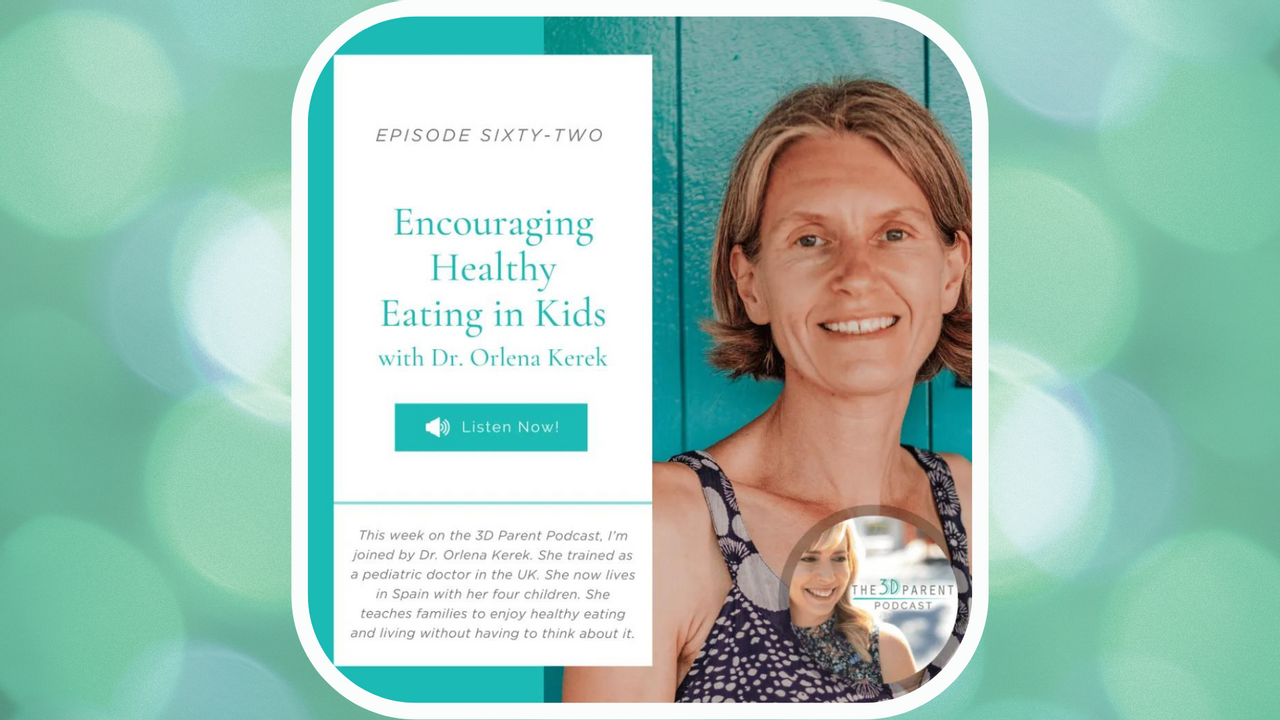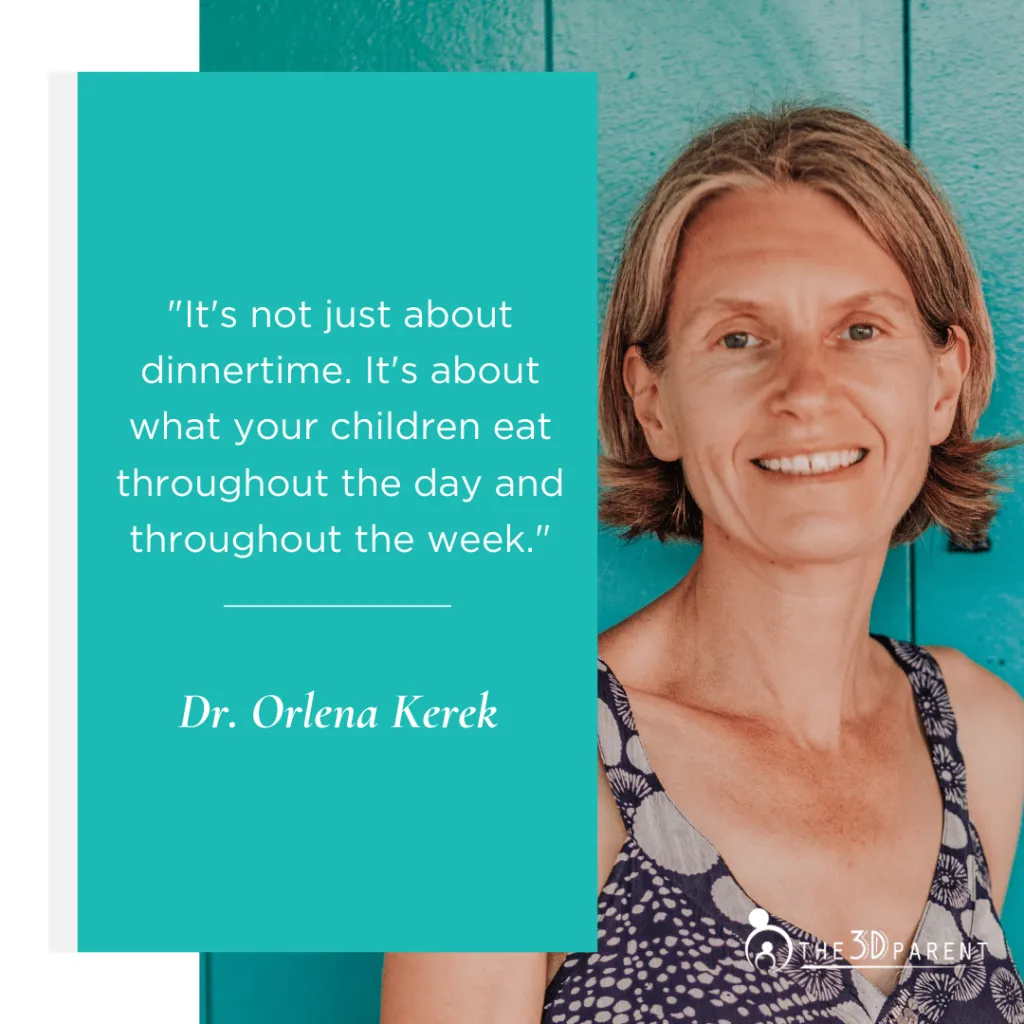[00:56] Today on the podcast I’m joined by Dr. Orlena Kerek. Dr. Orlena trained as a pediatric doctor in the UK. She now lives in Spain with her four children. She teaches families to enjoy healthy eating and living without having to think about it. She is the author of the book Feeding Toddlers and also hosts the podcast Fit and Fabulous at 40 and Beyond. She shares that when she became a mother, she was surprised how much she struggled to get her children to eat healthy foods and how they had stomach pains as a result of their eating. Through talking to other parents, she learned that she wasn’t alone-- eating is a very common struggle with children! This motivated her to work with parents and children on nutrition. She focuses on the whole family because it is important for every family member to eat healthfully.
[06:47] Dr. Orlena says that the best thing you can do for your children is model healthy eating habits. People often eat in the same way as an adult as they do when they are children. If you build up healthy habits while children are young, they will carry those habits into adulthood. Healthy eating will be a normal expectation for them. It’s also important to look at what your children are eating throughout the day. So often parents only focus on dinner time, and this makes dinner such a struggle.
[12:54] One of the most important things to focus on in your child’s diet is vegetables. Children need to be presented with vegetables again and again. You might think that your children don’t like vegetables, but it’s important to look at what else they’re eating. If their diet is high in processed foods, this could be contributing to their picky eating. Processed foods can dilute the taste of other foods because of the higher salt and sugar content. It can be helpful to pair vegetables with foods kids do like.
[13:29] Parents tend to force their children to eat vegetables and other healthy foods around this time, but their children have usually filled up on foods that are higher in sugar and glucose throughout the day. It’s very common for children to have already met their caloric needs by dinner time. So at the dinner table, they’re not very hungry and won’t be up for eating foods that are less appealing to them. So it’s vital to examine what children are eating throughout the day. If they are eating more fruits and vegetables at breakfast, snacks, and lunch, dinner won’t be as big of a deal.
[20:02] Some children are more adventurous and willing to try new foods, and other children are pickier. Often there is a range of attitudes toward food, even in the same family! When it comes to helping picky eaters, it’s first important to acknowledge that there is a large spectrum. Extreme picky eating actually qualifies as eating less than ten foods. If that’s what’s happening with your child, it’s time to seek professional help. It’s also important to recognize that there are a lot of reasons why a child is a picky eater. And it’s not the parents’ fault.
[22:25] On a positive note, we have our children’s whole childhood to teach them healthy eating. It’s not typically something that comes naturally. As parents, we have a responsibility to decide the menu and help our children with portion sizes. Limit carbohydrates like bread and pasta, but you can give your children more “free reign” over fruits and vegetables. It can also be helpful to have meals that are more of a “picnic” style where children can put together some things they like. For example, if you set out a Greek salad, family members can decide what to put on it. When it comes to portion sizes, it’s typically about what a child can hold in their hand. Don’t force adult sizes on your children.
[30:22] Parents often have a lot of anxiety around their children’s eating habits, but this can sometimes make matters worse. The reality is that your children are not going to starve themselves. And if they are growing, they are getting the nutrients they need. There’s always room for improvement, and there are things you can do to help your children get more fruits and veggies in, but you do want to allow them some control, especially as they get older. You can help them take responsibility for their own health. You can look at the bigger picture rather than the short term.
[36:34] I shared with Dr. Orlena about my daughter’s decision to become a vegetarian. I understood her desire to do so but was worried about her getting enough nutrients. Dr. Orlena actually encourages a more plant-based diet, although some meat is also okay. But she says that children beginning to think about the ethics of their eating is a good thing. She reminds us that there are lots of ways to get protein besides animal products. Lentils and legumes are some of the best sources. If they are eating those proteins and a variety of foods, their choices shouldn’t be a problem.
[43:48] Dr. Orlena encourages parents not to make separate meals for the family. If some family members have different needs or preferences, you can start with a base and then have some different options and substitutions. But remember that your healthy meal as a parent is a healthy meal for your child. You want to eat around the same things as your children so you can model healthy habits. Eating is about nourishing our bodies. While it is pleasurable, it’s not all about pleasure. You can discuss the purpose behind food with your children to help them understand this early on.
[52:36] The foundation of eating you build with your children now will carry them through the rest of their lives. Use meal and exercise times as a family as a way of connection. Dr. Orlena has many resources available for more help with children’s nutrition.











